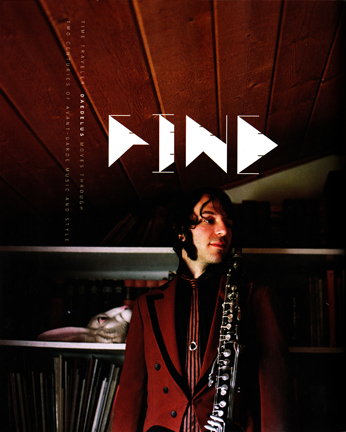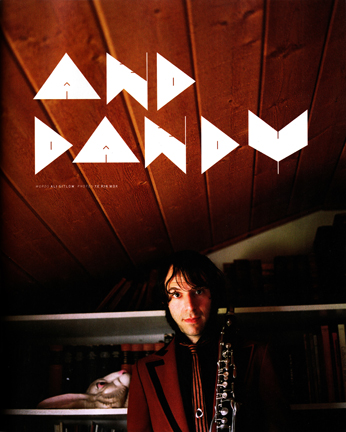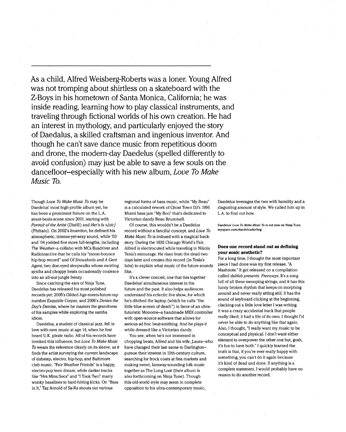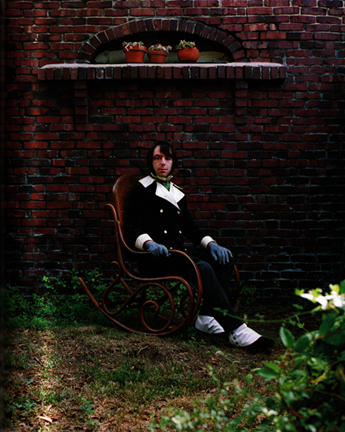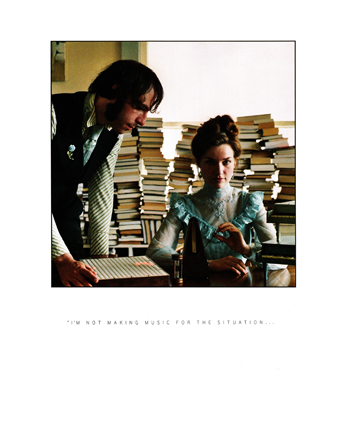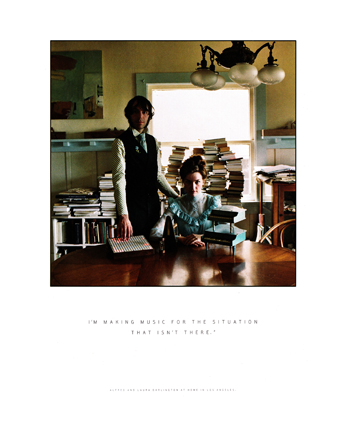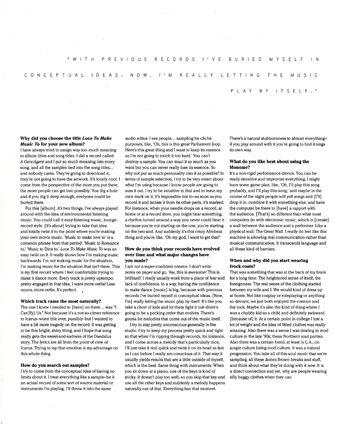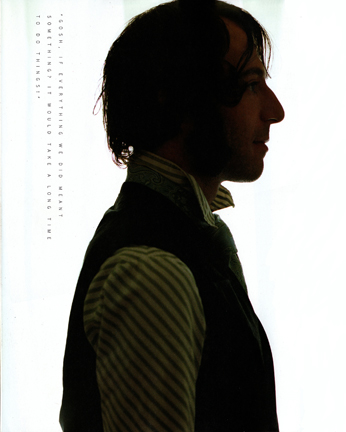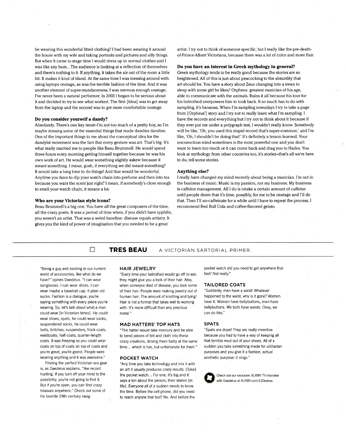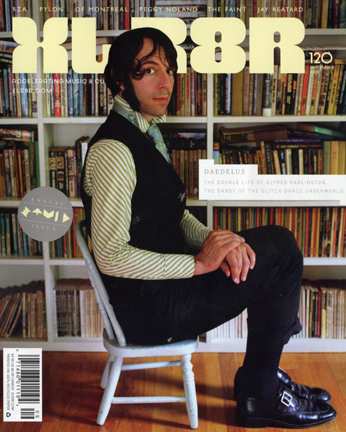
FINE & DANDY
As a child, Alfred Weisberg-Roberts was a loner. Young Alfred was not tromping about shirtless on a skateboard with the Z-Boys in his hometown of Santa Monica, California; he was inside reading, learning how to play classical instruments, and traveling through fictional worlds of his own creation. He had an interest in mythology, and particularly enjoyed the story of Daedalus, a skilled craftsman and ingenious inventor. And though he can’t save dance music from repetitious doom and drone, the modern-day Daedelus (spelled differently to avoid confusion) may just be able to save a few souls on the dancefloor–especially with his new album, Love To Make Music To.
Though Love To Make Music To may be Daedelus’ most high-profile album yet, he has been a prominent fixture on the L.A. avant-beats scene since 2001, starting with Portrait of the Artist (Distill) and Her’s Is >[sic] (Phthalo). On 2002’s Invention, he defined his atmospheric, intense-yet-sexy sound, while ’03 and ’04 yielded five more full-lengths, including The Weather–a collabo with MCs Busdriver and Radioinactive that he calls his “moon-bounce hip-hop record” and Of Snowdonia and A Gent Agent, two doe-eyed sleepwalks whose swirling synths and choppy beats occasionally coalesce into an all-out jungle frenzy.
Since catching the ears of Ninja Tune, Daedelus has released his most polished records yet: 2005’s Gilded Age-meets-future-rap number Exquisite Corpse, and 2006’s Denies the Day’s Demise, where he masters the grandness of his samples while exploring the samba idiom.
Daedelus, a student of classical jazz, fell in love with rave music at age 14, when he first heard U.K. pirate radio. All of his records have invoked this influence, but Love To Make Music To wears the reference clearly on its sleeve, as it finds the artist surveying the current landscape of dubstep, electro, hip-hop, and Baltimore club music. “Fair Weather Friends” is a happy, electro-pop teen dream, while darker tracks like “Hrs:Mins:Secs” and “I Took Two” marry wonky basslines to hard-hitting kicks. On “Bass in It,” Taz Arnold of Sa-Ra shouts out various regional forms of bass music, while “My Beau” is a calculated rework of Ghost Town DJ’s 1996 Miami bass jam “My Boo” that’s dedicated to Victorian dandy Beau Brummell.
Of course, this wouldn’t be a Daedelus record without a fanciful concept, and Love To Make Music To is imbued with a magical back-story. During the 1893 Chicago World’s Fair, Alfred is electrocuted while traveling in Nikola Tesla’s entourage. He rises from the dead two days later and creates this record (in Tesla’s labs) to explain what music of the future sounds like.
It’s a clever conceit, one that ties together Daedelus’ simultaneous interest in the future and the past. It also helps audiences understand his eclectic live show, for which he’s ditched the laptop (which he calls “the little blue screen of death”) in favor of an ultra-futuristic Monome–a handmade MIDI controller with open-source software that allows for serious ad hoc beat-smithing. And he plays it while dressed like a Victorian dandy.
You see, when he’s not immersed in chopping beats, Alfred and his wife, Laura–who have changed their last name to Darlington–pursue their interest in 19th-century culture, searching for frock coats at flea markets and making sweet, faraway-sounding folk music together as The Long Lost (their album is also forthcoming on Ninja Tune). Though this old-world style may seem in complete opposition to his ultra-contemporary music, Daedelus leverages the two with humility and a disgusting amount of style. We called him up in L.A. to find out how.
Does one record stand out as defining your sonic aesthetic?
For a long time, I thought the most important piece I had done was my first release, “A Mashnote.” It got released on a compilation called dublab presents: Freeways. It’s a song full of all these swooping strings, and it has this funny broken rhythm that keeps on morphing around and never really sitting still. It has the sound of keyboard clicking at the beginning, clacking out a little love letter I was writing. It was a crazy accidental track that people really liked; it had a life of its own. I thought I’d never be able to do anything like that again. Also, I thought, “I really want my music to be conceptual and physical. I don’t want either element to overpower the other one but, gosh, it’s fun to have both.” I quickly learned the truth is that, if you’re ever really happy with something, you can’t do it again because it’s kind of dead and done. If anything is a complete statement, I would probably have no reason to do another record.
Why did you choose the title Love To Make Music To for your new album?
I have always tried to assign way too much meaning to album titles and song titles. I did a record called A Gent Agent and I put so much meaning into every song, and all the samples tied into the song titles… and nobody cares. They’re going to download it, they’re not going to have the artwork. It’s totally cool. I come from the perspective of the more you put there, the more people can get into possibly. You dig a hole and if you dig it deep enough, everyone could be buried there.
For this [album], it’s two things. I’ve always played around with the idea of environmental listening music. You could call it easy-listening music, lounge-record style. [It’s about] trying to take that idea and totally twist it to the point where you’re making your own movie music. ‘Music to make love to’ is a common phrase from that period: ‘Music to Romance to,’ ‘Music to Dine to.’ Love To Make Music To was an easy twist on it. It really shows how I’m making music backwards. I’m not making music for the situation, I’m making music for the situation that isn’t there. This is my first record where I feel comfortable trying to make it dance more. Every track is pretty uptempo, pretty engaged in that idea. I want more verbs! Less nouns, more verbs. It’s perfect.
Which track came the most naturally?
The one I knew I needed to [have] on there… was “I Car(Ry) Us.” Not because it’s a not-so-clever reference to Icarus–worst title ever, possibly–but I wanted to have a bit more tragedy on the record. It was getting to be this bright, shiny thing, and I hope that song really gets the sweet-and-sadness of the Daedalus story. The lyrics are all from the point of view of Icarus. Trying to tap that emotion is my advantage on this whole thing.
How do you search out samples?
I try to come from the conceptual idea of having no limits about it. I treat everything like a sample–be it an actual record of some sort of source material or instruments I’m playing, I’ll throw it into the same audio editor. I see people… sampling for cliché purposes, like, ‘Oh, this is this great Parliament loop. Here’s this great thing and I want to keep its essence so I’m not going to touch it too hard.’ You can’t destroy a sample. You can maul it as much as you want but you can never really lose its essence. So why not put as much personality into it as possible? In terms of sample selection, I try to be very smart about what I’m using because I know people are going to suss it out. I try to be sensitive to that and to leave my own mark on it. It’s impossible not to–as soon as you record it and isolate it from its other parts, it’s marked. For instance, when your needle drops on a record, at home or at a record store, you might hear something, a rhythm turned around a way you never could hear it because you’re not starting on the one, you’re starting on the two-and. And suddenly it’s this crazy Afrobeat thing and you’re like, ‘Oh my god, I want to get that!’
How do you think your records have evolved over time and what major changes have you made?
I am not a super-confident creator. I don’t write notes on paper and go, ‘Aw, this is awesome! This is brilliant!’ I really usually work from a place of fear and lack of confidence. In a way, having the confidence to make dance [music] is big, because with previous records I’ve buried myself in conceptual ideas. [Now, I’m] really letting the music play by itself. It’s like you take a choir of kids and let them fight it out–there’s going to be a pecking order that evolves. There’s gonna be melodies that come out of the music itself.
I try to stay pretty unconscious generally in the studio. I try to keep my process pretty quick and tight so that when I’m ripping through records, for instance, and I come across a melody that’s particularly nice, I’ll just take it real quick and twist it on its head as fast as I can before I really am conscious of it. That way it usually yields results that are a little outside of myself, which is the best. Same thing with instruments: When you sit down at a piano, one of the keys is kind of sticky, it doesn’t play too well, so you skip that key and use all the other keys and suddenly a melody happens naturally out of that. Everything has that moment. There’s a natural stubbornness to almost everything–if you play around with it you’re going to find it sings its own way.
What do you like best about using the Monome?
It’s a non-rigid performance device. You can be really sensitive and improvise everything. I might have some game plan, like, ‘Oh, I’ll play this song probably, and I’ll play this song,’ and maybe in the course of the night people will yell songs and [I’ll] drop it in, combine it with something else, and have the computer be there to [have] a rapport with the audience. [That’s] so different than what most computers do with electronic music, which is [create] a wall between the audience and a performer. Like a physical wall. The Great Wall. I really do feel like this machine is allowing real communication rather than musical communication. It transcends language and all these kind of barriers.
When and why did you start wearing frock coats?
That was something that was at the back of my brain for a long time. The heightened sense of itself, the foreignness. The real sense of the clothing started between my wife and I. We would kind of dress up at home. Not like cosplay or roleplaying or anything so deviant, we just both enjoyed the contour and the look. Maybe it’s also the kind of thing where I was a chubby kid as a child and definitely awkward [because of] it. At a certain point in college I lost a lot of weight and the idea of fitted clothes was really amazing. Also there was a sense I was dealing in mod culture in the late ’90s; these Northern soul parties. Also there was a certain bend, at least in L.A., on jungle culture being mod culture. It was a natural progression. You take all of this soul music that we’re sampling, all these James Brown breaks and stuff, and think about what they’re doing with it now. It is a direct connection and yet, why are people wearing silly baggy clothes when they can be wearing this wonderful fitted clothing? I had been wearing it around the house with my wife and taking portraits and pictures and silly things. But when it came to stage time I would dress up in normal clothes and I was like any bum... The audience is looking at a reflection of themselves and there’s nothing to it. If anything, it takes the air out of the room a little bit. It makes it kind of bland. At the same time I was messing around with using laptops onstage, as was the terrible fashion of the time. And it was another element of super-mundaneness. I was nervous enough onstage; I’ve never been a natural performer. In 2003 I began to be serious about it and decided to try to see what worked. The first [idea] was to get away from the laptop and the second was to get more comfortable onstage.
Do you consider yourself a dandy?
Absolutely. There’s one key tenet–I’m not too much of a pretty boy, so I’m maybe missing some of the essential things that made dandies dandies. One of the important things to me about the conceptual idea for the dandyist movement was the fact that every gesture was art. That’s big. It’s what really married me to people like Beau Brummell. He would spend three hours every morning getting himself together because he was his own work of art. He would wear something slightly askew because it meant something. I mean, gosh, if everything we did meant something? It would take a long time to do things! And that would be wonderful. Anytime you have to dip your watch chain into perfume and then into tea because you want the scent just right? I mean, if somebody’s close enough to smell your watch chain, it means a lot.
Who are your Victorian style icons?
Beau Brummell’s a big one. You have all the great composers of the time, all the crazy poets. It was a period of time when, if you didn’t have syphilis, you weren’t an artist. That was a weird baseline: disease equals artistry. It gives you the kind of power of imagination that you needed to be a great artist. I try not to think of someone specific, but I really like the pre-death-of-Prince-Albert Victorians, because there was a lot of color and more flair.
Do you have an interest in Greek mythology in general?
Greek mythology tends to be really good because the stories are so heightened. All of this is just about peacocking to the absurdity that art should be. You have a story about Zeus changing into a swan to sleep with some girl he likes? Orpheus: greatest musician of his age, able to communicate with the animals. Ruins it all because his love for his betrothed overpowers him to look back. It so much has to do with sampling, it’s bananas. When I’m sampling nowadays I try to take a page from [Orpheus’] story and I try not to really learn what I’m sampling. I have the records and everything but I try not to think about it because if they ever put me under a polygraph test, I wouldn’t really know. Somebody will be like, ‘Oh, you used this stupid record that’s super-common,’ and I’m like, ‘Oh, I shouldn’t be doing that!’ It’s definitely a lesson learned. Your unconscious mind sometimes is the most powerful one and you don’t want to learn too much or it can come back and drag you to Hades. You look at mythology from other countries too, it’s stories–that’s all we’re here to do, tell some stories.
Anything else?
I really have changed my mind recently about being a musician. I’m not in the business of music. Music is my passion, not my business. My business is caffeine management. All I do is intake a certain amount of caffeine until people deem that it’s time, possibly, for me to be onstage and I’ll do that. Then I’ll un-caffeinate for a while until I have to repeat the process. I recommend Red Bull Cola and coffee-flavored gelato.
Tres Beau
A Victorian sartorial primer.
“Being a guy and existing in our current world of accessories, like what do we have?” opines Daedelus. “I can wear sunglasses. I can wear shoes. I can wear maybe a baseball cap. It plain old sucks. Fashion is a dialogue; you’re saying something with every piece you’re wearing. So, let’s talk about what a man could wear [in Victorian times]. He could wear shoes, spats, he could wear socks, suspendered socks, he could wear belts, britches, suspenders, frock coats, waistcoats, half coats, quarter-length coats. It was freezing so you could wear coats on top of coats on top of coats and you’re great, you’re grand. People were wearing anything and it was awesome.”
Finding the perfect Victorian-era gear is, as Daedelus explains, “like record hunting. If you turn off your mind to the possibility, you’re not going to find it. But if you’re open, you can find crazy treasure anywhere.” Check out some of his favorite 19th-century swag.
Hair jewelry
“Every time your betrothed would go off to war, they might give you a lock of their hair. Also, when someone died of disease, you took some of their hair. People were making jewelry out of human hair. The amount of knotting and tying! Hair is not a format that takes well to working with. It’s more difficult than any precious metal.”
Mad hatters’ top hats
“The hatter would take mercury and be able to bend pieces of felt and cloth into these crazy creations, driving them batty at the same time… which is fun, but unfortunate for them.”
Pocket watch
“Any time you take technology and mix it with an art it usually produces crazy results. [Take] the pocket watch… For one, it’s big and it says a ton about the person, their station [in life]. Everyone all of a sudden needs to know the time. Before the cell phone, did you need to reach anyone that fast? No. And before the pocket watch did you need to get anywhere that fast? Not really.”
Tailored coats
“Suddenly, men have a waist! Whatever happened to the waist, why is it gone? Women have it. Women have bellybuttons, men have bellybuttons. We both have waists. Okay, we can do this.”
Spats
“Spats are dope! They are really inventive because you had to have a way of keeping all that terrible mud out of your shoes. All of a sudden you take something made for utilitarian purposes and you give it a fashion, actual aesthetic purpose–it sings.”
- ALI GITLOW
